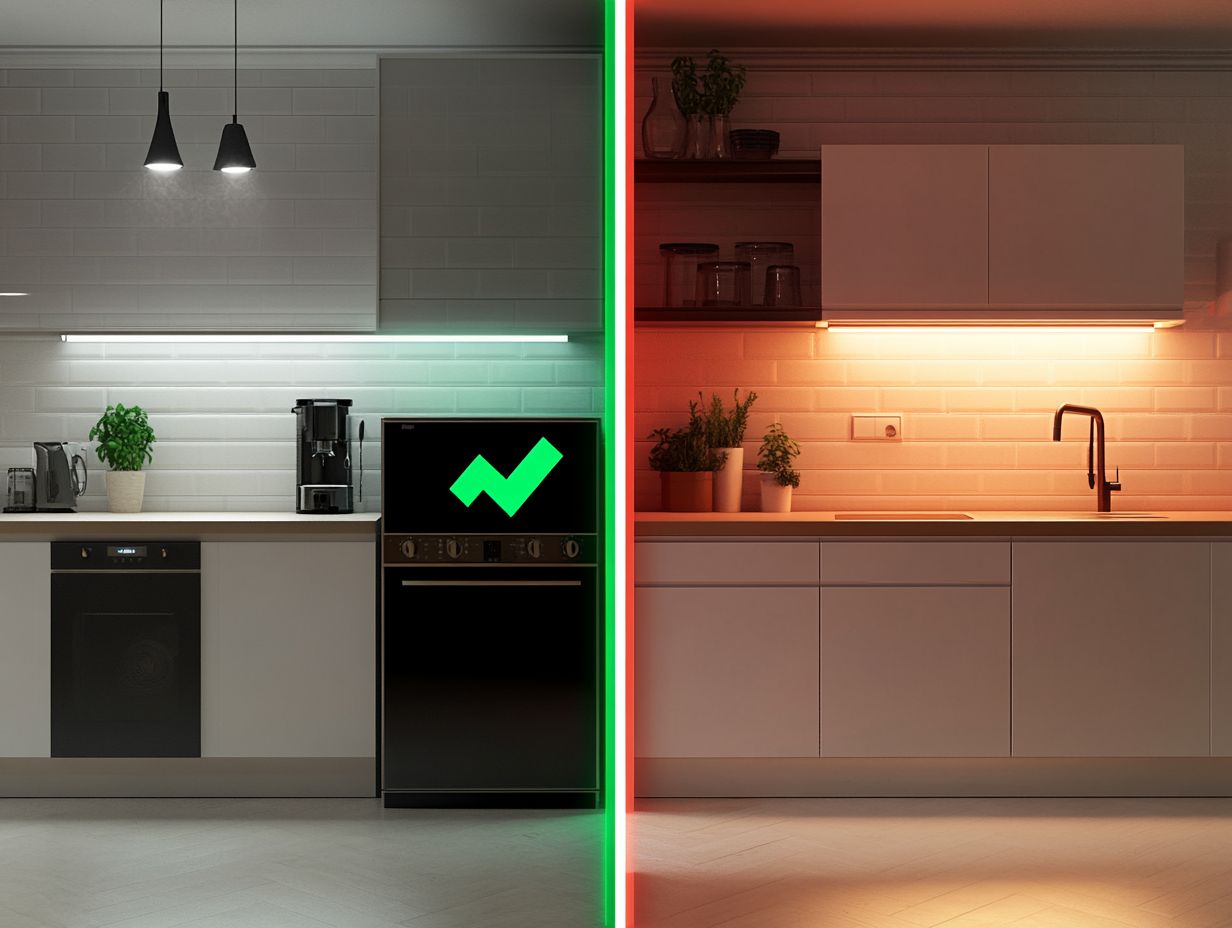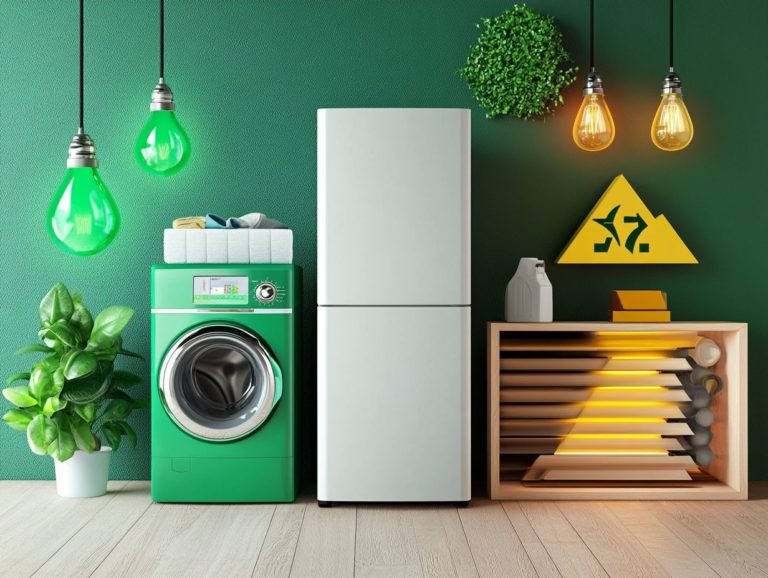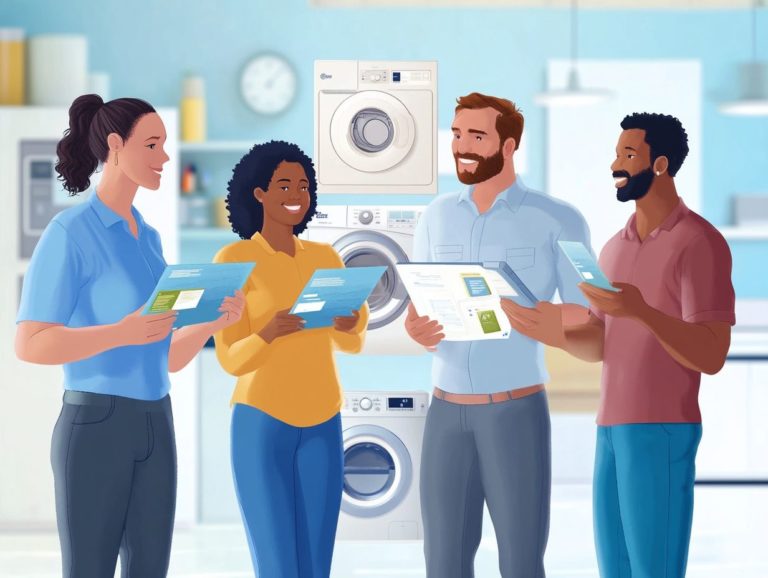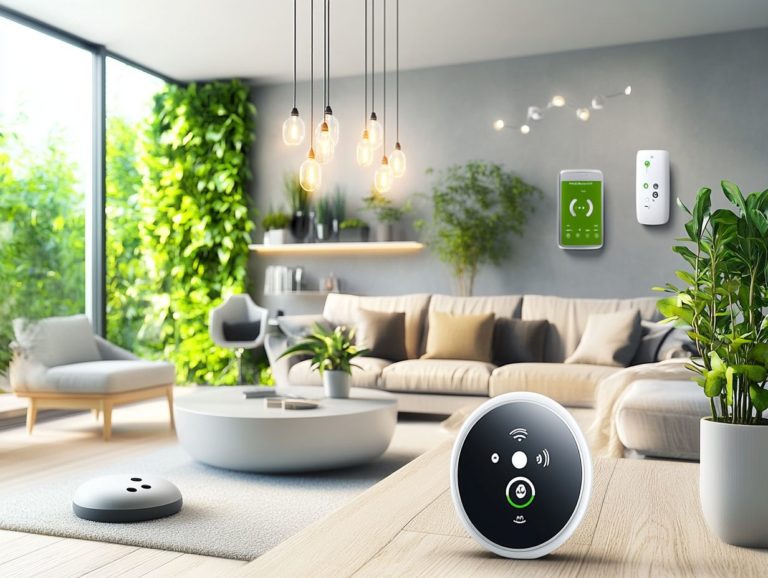Energy-Efficient Appliances: Myths vs. Facts
In a world focused on sustainability, energy-efficient appliances are gaining popularity. They help conserve energy and save you money!
Yet, myths about their effectiveness can cloud your judgment. Let s clear up these misconceptions and explore the real benefits of these appliances.
Whether you re considering an upgrade or just want to learn more, you’ll discover how to make choices that help both your wallet and the planet!
Contents
- Key Takeaways:
- Common Myths Surrounding Energy-Efficient Appliances
- The Facts About Energy-Efficient Appliances
- How to Choose the Right Energy-Efficient Appliance
- Tips for Maximizing Energy Efficiency
- Frequently Asked Questions
- What are energy-efficient appliances?
- Are energy-efficient appliances more expensive than traditional ones?
- Do energy-efficient appliances perform as well as traditional ones?
- Is it true that turning off appliances when not in use saves more energy than using energy-efficient ones?
- Can energy-efficient appliances be used with renewable energy sources?
- Is it necessary to replace all my appliances with energy-efficient ones at once?
Key Takeaways:
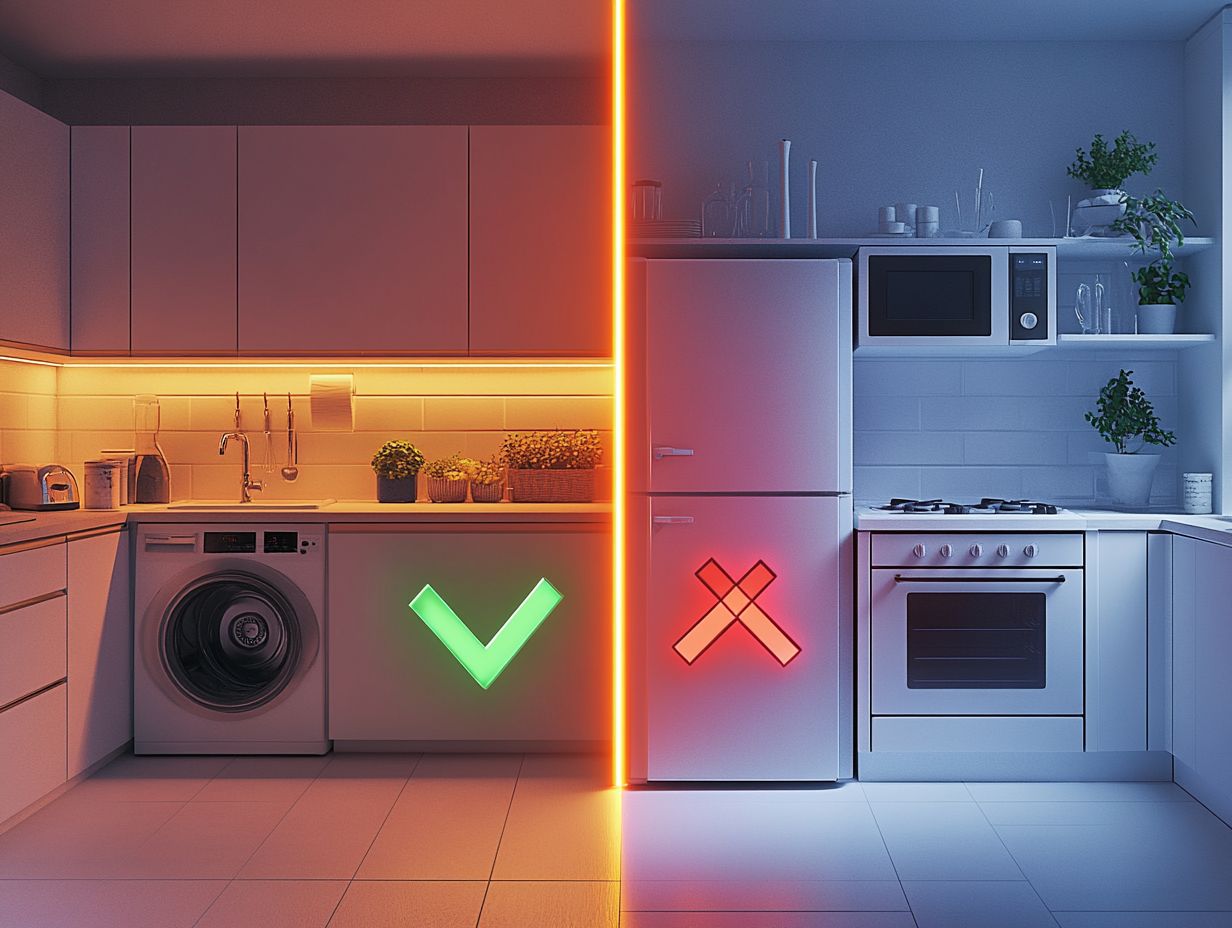
Energy-efficient appliances reduce utility bills and help the environment. It s essential to debunk the myths surrounding them to make smart choices.
Consider factors like energy ratings, size, and how you plan to use the appliance.
What are Energy-Efficient Appliances?
Energy-efficient appliances are designed to use less energy while delivering excellent performance. By choosing these appliances, you not only cut down on energy consumption but also lower your electric bills.
These appliances usually meet strict criteria from ENERGY STAR, a program helping consumers identify energy-efficient products. Investing in options like refrigerators, dishwashers, and HVAC systems can enhance comfort while reducing heating and cooling costs.
The advantages extend beyond financial savings; they also help reduce your carbon footprint. For example, smart thermostats allow you to optimize heating and cooling based on real-time occupancy, leading to significant savings.
LED lights and compact fluorescent lamps consume much less energy than traditional incandescent bulbs and last longer. Their impressive ratings indicate their effectiveness in reducing energy waste, making them a great investment for eco-conscious homeowners.
Common Myths Surrounding Energy-Efficient Appliances
Despite growing awareness, several myths about energy-efficient appliances persist. Understanding how energy-efficient appliances save you money can help dispel these misconceptions and improve your ability to make informed decisions.
Many believe that energy-efficient appliances are too expensive or unreliable. Understanding the environmental impact of energy-efficient appliances is vital for homeowners looking to improve their home’s efficiency.
Debunking Misconceptions
It’s essential to debunk misconceptions about energy-efficient appliances to understand how they can lower your electric bill and energy consumption. You might think all energy-efficient appliances are costly, but the cost-effectiveness of energy-efficient appliances shows that the initial investment often pays off with long-term energy savings.
Some believe these appliances underperform compared to traditional models, which is simply untrue. Advancements in technology have led to highly efficient solutions for various household tasks.
Studies show that households can save up to 30% annually on energy costs by switching to energy-efficient options like LED lighting or Energy Star-rated washing machines, which use less water and electricity.
According to the U.S. Department of Energy, Energy Star appliances prevent greenhouse gas emissions equivalent to the annual output of 27 million cars.
Many consumers overlook the durability of these appliances; many are built to outlast their conventional counterparts, adding value over time.
Dispelling these myths helps you make informed choices that benefit both your wallet and the environment.
The Facts About Energy-Efficient Appliances
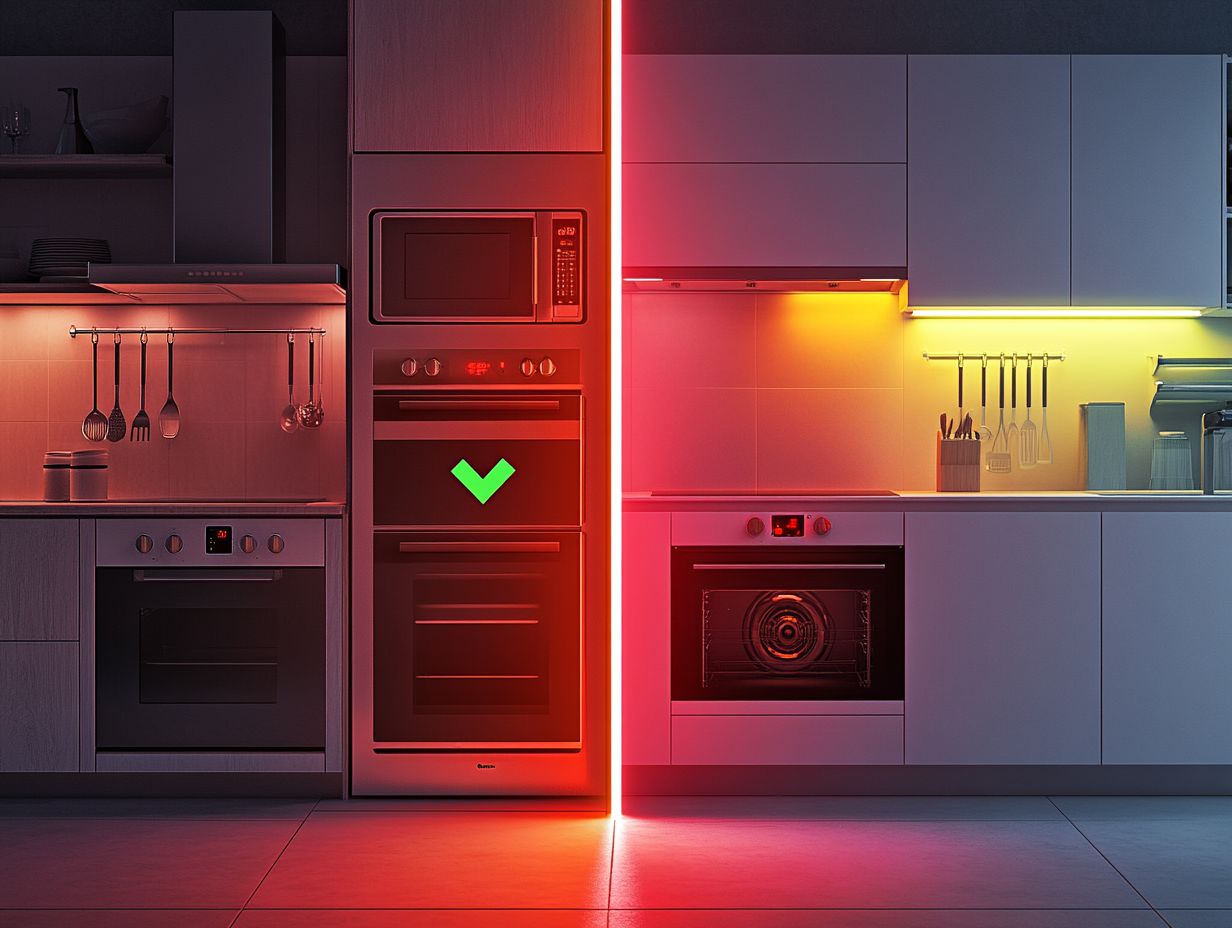
Understanding the details of energy-efficient appliances is essential for homeowners who want to make informed choices. By following practical tips for energy-efficient appliance use, you can achieve significant energy savings and reduced electric bills.
These appliances are designed to minimize energy consumption without compromising performance. This results in lower heating and cooling costs while also reducing your ecological footprint.
Investing in products like ENERGY STAR-rated HVAC systems and smart thermostats can unlock substantial long-term benefits, enhancing both your home’s efficiency and your overall comfort!
Benefits and Cost Savings
The benefits and cost savings of energy-efficient appliances extend beyond immediate financial relief. They also support a sustainable lifestyle by significantly reducing energy consumption.
When you invest in these appliances, you can expect lower electric bills and improved home efficiency, which are essential for managing heating and cooling costs effectively.
For instance, a recent study found that families switching to Energy Star-rated refrigerators saved an average of 15% on their monthly electricity expenses. This change eased the strain on budgets and contributed to a meaningful reduction in their carbon footprint.
Many states offer rebates for purchasing energy-efficient appliances, making them even more affordable. By prioritizing long-term cost efficiency over short-term savings, the initial investment pays off in reduced energy costs and increased home value over time!
How to Choose the Right Energy-Efficient Appliance
Selecting the right energy-efficient appliance requires understanding several factors that impact both performance and energy consumption. To make an informed choice, consider exploring how to choose energy-efficient appliances to ensure your investment aligns with your long-term home energy goals.
Pay attention to the ENERGY STAR rating, which indicates that the appliance meets specific energy efficiency standards. Also, consider the overall cost-effectiveness and durability of the appliance.
Opting for appliances equipped with smart technology features, like smart thermostats, can enhance efficiency and support a more sustainable lifestyle.
Factors to Consider
When selecting energy-efficient appliances, consider several critical factors to ensure your choice is cost-effective and aligns with your energy consumption goals. Key considerations include the appliance’s energy efficiency rating and balancing upfront costs with long-term savings.
Understanding energy ratings is vital; appliances with higher ratings typically consume less electricity, translating into lower utility bills. Weigh the initial investment against projected energy savings to evaluate your return on investment.
Compatibility with your current systems is crucial to avoid unnecessary upgrades or inefficiencies. Consulting with professionals can help ensure seamless integration.
Smart technology plays a significant role, providing real-time monitoring and automated adjustments that enhance convenience and promote substantial energy conservation over time.
Tips for Maximizing Energy Efficiency
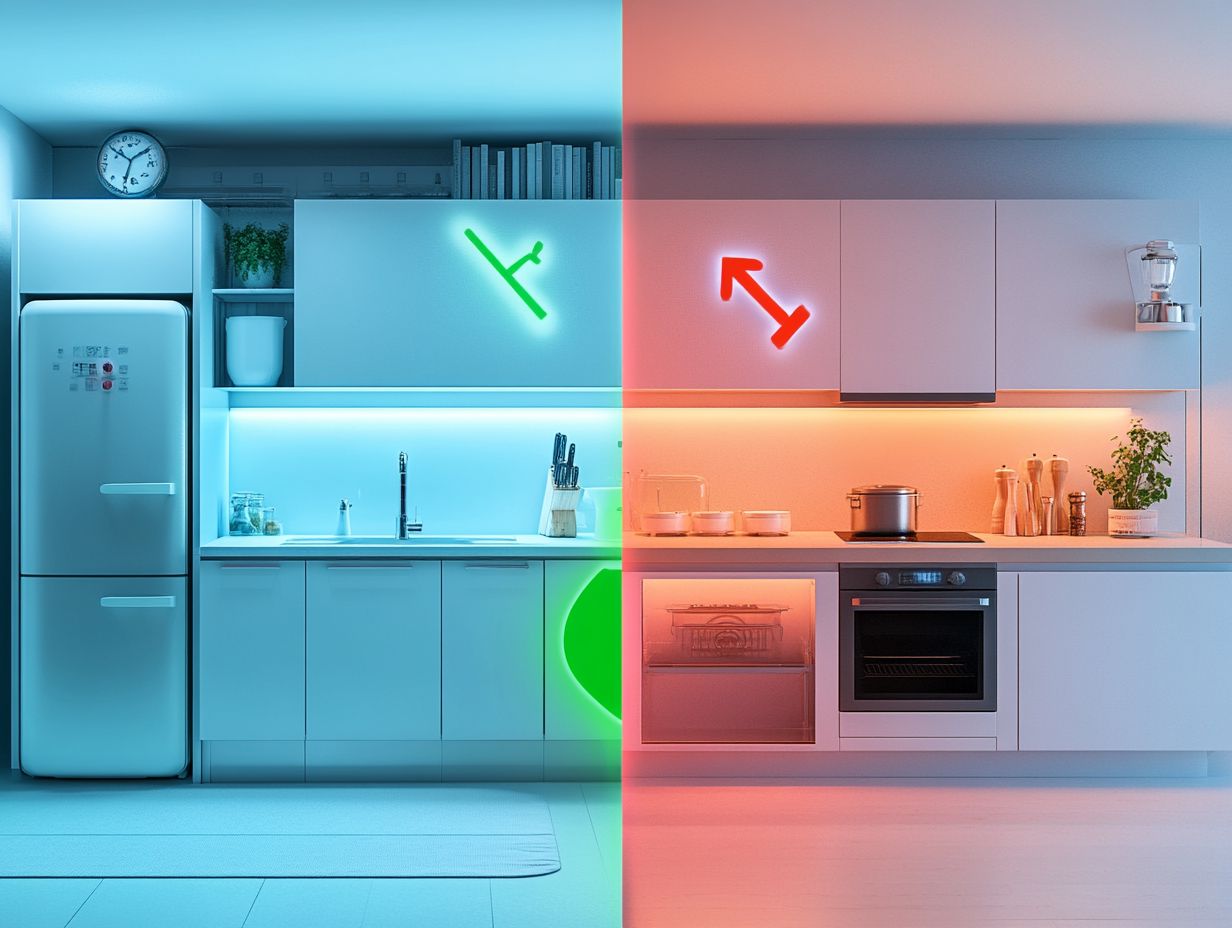
Maximizing energy efficiency in your home can yield substantial cost savings while reducing energy consumption, benefiting both your household budget and the environment.
Implement simple yet impactful energy-saving strategies, such as using energy-efficient appliances, maintaining optimal temperature settings, and embracing smart technology for effective home energy management.
These practices not only conserve energy but also support a sustainable lifestyle, ultimately leading to lower electric bills.
Explore energy-efficient appliances today and check for local rebates to maximize your savings!
Simple Changes to Save Energy
Implementing simple changes can lead to profound results in saving energy and reducing electric bills. This makes it easier for you to enhance your overall energy efficiency.
By adjusting your thermostat by just a few degrees, you could save up to 15% on heating and cooling costs. Switching to LED lighting can cut your energy use by about 75%, providing both longevity and lower bills.
Take the story of a family in Texas, for example. After making these adjustments, they reported annual savings of over $300. By prioritizing energy-efficient habits like unplugging devices when not in use and using power strips they significantly reduced their carbon footprint.
These small changes can lead to big savings! They benefit not just your household budget but the environment as well. Start saving energy today and see your bills drop!
Frequently Asked Questions
-
What are energy-efficient appliances?
Energy-efficient appliances are devices that use less power to operate, which leads to lower bills and a reduced impact on the environment. They use advanced technology to perform the same tasks as traditional appliances but consume less energy.
-
Are energy-efficient appliances more expensive than traditional ones?
While the initial cost might be higher, energy-efficient appliances can save you money over time through reduced energy bills. Many governments offer rebates and incentives for purchasing these appliances, making them more affordable.
-
Do energy-efficient appliances perform as well as traditional ones?
Yes, energy-efficient appliances are designed to perform at the same level as traditional appliances. In fact, many utilize advanced technology that can enhance performance and functionality.
-
Is it true that turning off appliances when not in use saves more energy than using energy-efficient ones?
No, this is a common myth. While it is important to turn off appliances when not in use, understanding different types of energy-efficient appliances is key, as they are designed to use less energy during operation, resulting in greater overall energy savings.
-
Can energy-efficient appliances be used with renewable energy sources?
Yes, you can use energy-efficient appliances with renewable energy sources like solar panels or wind turbines. This pairing can further reduce your energy bills and carbon footprint.
-
Is it necessary to replace all my appliances with energy-efficient ones at once?
No, you don t need to replace everything at once. Start by replacing the appliances that consume the most energy, such as refrigerators, washing machines, and dishwashers. Gradually replace others as needed to make the transition more manageable and budget-friendly.

